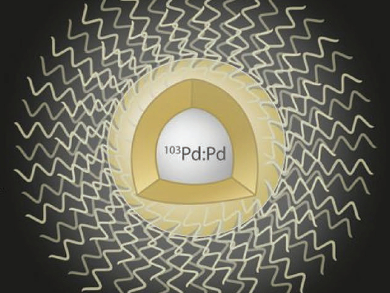Brachytherapy, the implantation of radioactive material directly into a tumor, is commonly used against prostate cancer. The treatment is often effective, and the radiation is contained inside the tumor. However, the method requires the insertion of dozens of millimeter-sized radioactive metal seeds, which remain in the prostate permanently. This causes discomfort and swelling.
Marc-André Fortin, Université Laval, Québec, Canada, and colleagues have developed radioactive gold nanoparticles (NPs) with palladium cores (pictured). Solutions of NPs can be injected with small needles, which makes the treatment less invasive than with millimeter-sized metal particles. The team prepared palladium nanoparticles doped with radioactive 103Pd from a H2PdCl4/103PdCl2 precursor solution. They then added a HAuCl4 solution to coat the Pd NPs with gold. In a final step, they used NH2-PEG-SH (PEG = polyethylene glycol) to graft a stabilizing PEG layer onto the particles.
The team tested the radioactive NPs in mice which were injected with human prostate cancer cells. The particles remained in the tumors for weeks and inhibited tumor growth. According to the researchers, this method could allow tuning the dose of radioactivity, is less invasive than current technologies, and also leads to fewer artifacts, e.g., in computed tomography (CT), than larger metal particles.
- Low-Dose Prostate Cancer Brachytherapy with Radioactive Palladium–Gold Nanoparticles,
Myriam Laprise-Pelletier, Jean Lagueux, Marie-France Côté, Thomas LaGrange, Marc-André Fortin,
Adv. Healthcare Mat. 2017.
DOI: 10.1002/adhm.201601120




